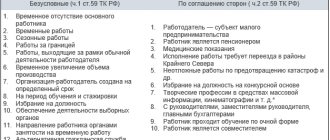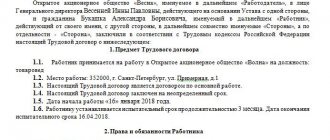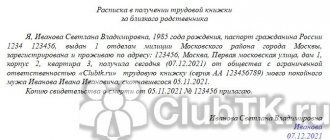An employment contract is an agreement between an employee and an employer, which by default is recognized as unlimited. The validity period of an employment contract can only be specified in cases specified by law. There are quite a lot of such situations, we suggest you sort them out.
Payroll and personnel records
What is the term of the contract
The Civil Code, which establishes the general rules for the conclusion and validity of an agreement, does not define its duration. But there is Article 425 of the Civil Code of the Russian Federation, which indicates that the contract comes into force and becomes binding on the parties from the moment of its conclusion.
If the agreement specifies the date of conclusion, but there is no date or event with which the termination of the contract is associated, then it is recognized as unlimited. In this case, it is possible to dismiss an employee without his consent only for a number of reasons (Articles 71 and 81 of the Labor Code of the Russian Federation).
In a fixed-term employment contract, the validity period may be tied to a specific date or to the occurrence of a certain event. For example, before the main employee returns from maternity leave or returns from study without work.
Features of urgent TD
Conscript employees have the same privileges and guarantees as other hired personnel. But there are nuances associated with:
- calculation of vacation pay;
- lack of severance pay.
Registration of a “conscript” is appropriate if the employment relationship is not of an open-ended nature due to:
- specifics of the required work - see Art. 68 Labor Code of the Russian Federation;
- conditions for their implementation, which are named in Art. 59 Labor Code of the Russian Federation.
For example, this type of TD is often concluded for a period of time:
- employee's maternity leave;
- carrying out seasonal/temporary work for up to 2 months;
- performing functions that are not directly related to the main activities of the company;
- solving a specific production problem.
Accordingly, the text of such a TD must contain the rationale for its conclusion, which directly follows from the essence of Art. 57 Civil Code of the Russian Federation. An individual entrepreneur has the right to conclude a fixed-term contract with the number of hired personnel of less than 35 people. For companies in the service and trade sectors, the limit is 20 people.
When performing temporary work for up to 2 months. according to Art. 289 of the Labor Code of the Russian Federation does not provide for a probationary period. For seasonal workers, tests can last no more than 2 weeks (Article 70 of the Labor Code of the Russian Federation).
When can an employment contract specify a validity period?
The grounds on which it is possible to conclude a fixed-term employment contract are listed in Article 59 of the Labor Code of the Russian Federation. They can be divided into two groups:
- indication of the contract term is mandatory;
- the period is specified by agreement of the parties.
| Only a fixed-term contract is concluded | The period is specified by agreement of the parties |
| For the period of absence of a permanent employee, whose job is retained. | With small business employers, if the number of their employees does not exceed 35 people (in retail and consumer services - 20 people) |
| To perform temporary work lasting up to two months | With age pensioners and workers whose health condition allows only temporary work |
| To perform seasonal work | In organizations of the Far North regions and equivalent to them, if this is related to relocation to the place of work |
| With workers sent abroad | For urgent work to prevent disasters, accidents, accidents, epidemics, to eliminate their consequences and other emergency circumstances |
| To perform work that is not the usual activity of the employer | With crew members of sea and river vessels |
| In the case of a deliberately temporary (up to a year) expansion of production or volume of services. | With creative workers: in the media, theaters, cinematography, circuses, concert organizations, etc. |
| In organizations known to be created for a specific period or for a specific job | With managers, their deputies and chief accountants of organizations |
| With employees hired for practice, internship, vocational training | With full-time students |
| When elected to an elective position (or to an elected body), as well as to a position in government agencies, parties, etc. | With persons elected through a competition to fill the relevant position |
| When sent to temporary and public work by the employment service | With those applying for part-time work |
| When sent to alternative civil service | With employers-non-profit organizations, if the number does not exceed 35 people |
Both of these lists are open, that is, federal laws or the Labor Code of the Russian Federation may establish additional grounds for concluding a fixed-term employment contract.
Please note: an employer cannot unilaterally enter into a fixed-term employment contract if this requires the consent of both parties (in situations from the second column). If the employee does not agree to this, then an open-ended employment contract must be concluded with him or he must be refused employment altogether.
For how long can an employment contract be concluded with an employee in 2022? The Labor Code of the Russian Federation establishes only a maximum period of 5 years, there are no other restrictions.
If the established term of the employment contract has expired, this does not mean that it automatically terminates. No later than 3 days before the end of the period, the employer must send a written notice to the employee, and only after that can the dismissal procedure begin.
Article 58 of the Labor Code of the Russian Federation. Duration of the employment contract (current version)
1. Part 1 of the commented article, depending on the duration of the employment contract, provides for two types: an employment contract with an indefinite period and a fixed-term employment contract.
When concluding an employment contract for an indefinite period, the parties do not stipulate its duration at all. The agreement can only determine the date of its entry into force (see commentary to Article 61).
When concluding an employment contract for a certain period, the parties must provide for a specific period of its validity (one, two, four years, etc.). Employment contracts concluded for a specific period are called fixed-term employment contracts. Fixed-term employment contracts are usually concluded for a period not exceeding five years. An employment contract for a period of more than five years can be concluded only in cases expressly specified by the Code or other federal law.
2. Having secured the possibility of concluding fixed-term employment contracts, Art. 58, however, limits it to certain cases.
According to Part 2 of the commented article, a fixed-term employment contract is concluded in cases where the employment relationship cannot be established for an indefinite period, taking into account the nature of the work to be done or the conditions for its implementation. This general rule is specified in Part 1 of Art. 59 of the Labor Code, which determines which specific works, by their nature and conditions of execution, belong to the work for which a fixed-term employment contract is concluded (see commentary to Article 59). In other words, Part 2 of Art. 58, referring to Part 1 of Art. 59 of the Labor Code, actually reveals the content of such a legal category as “the nature of the work to be done or the conditions for its implementation.” In this regard, when concluding a fixed-term employment contract, it is necessary to indicate one of these circumstances (reasons) corresponding to the specific situation. Part 2 Art. 58 along with the circumstances listed in Part 1 of Art. 59 of the Labor Code, when a fixed-term employment contract is concluded taking into account the nature of the work and the conditions for its implementation, allows for the possibility of concluding a fixed-term employment contract by agreement of the parties in the absence of circumstances determining the nature and conditions of the work, in the cases provided for in Part 2 of Art. 59 (see commentary to it).
3. Part 3 of the commented article provides that if, when concluding an employment contract, the parties did not stipulate the duration of its validity, the contract is considered to be concluded for an indefinite period. Since this is a general rule, it should also apply to those cases where an employment contract is concluded in connection with the circumstances provided for in Part 1 of Art. 59 TK. Having concluded an employment contract with an employee for an indefinite period, the employer does not have the right to subsequently require him to conclude a fixed-term employment contract.
4. Part 4 of the commented article establishes the rule according to which, if neither party has demanded termination of a fixed-term employment contract due to the expiration of its term, and the employee continues to work after the expiration of the employment contract, the condition on the fixed-term nature of the employment contract is lost force and the employment contract is considered concluded for an indefinite period.
5. A fixed-term employment contract is considered a contract with an indefinite period even if it was initially concluded for a certain period without sufficient grounds, i.e. without taking into account the requirements established by the Code for concluding fixed-term employment contracts (see also commentary to Article 59), and this circumstance was established by the court (Part 5 of Article 58). For example, an employment contract concluded with an employee for a period of one year only on the basis that the employee is registered at his place of residence only temporarily must be recognized by the court as an agreement with an indefinite period. This rule is an important guarantee of protecting employees from the unreasonable conclusion of a fixed-term employment contract with them.
It should be noted that recognition of a fixed-term employment contract as an agreement with an indefinite period is possible only when the fact of concluding a fixed-term employment contract in violation of the requirements provided for by law is established by the court, and not by any other body.
6. Part 6 art. 58 provides additional guarantees to ensure the protection of employees from the unlawful conclusion of a fixed-term employment contract with them. In accordance with it, it is prohibited to conclude fixed-term employment contracts in order to evade the provision of rights and guarantees provided for employees who have entered into an employment contract for an indefinite period.
Thus, it will be considered unlawful to conclude an employment contract with an employee for a period of one and a half years on the grounds that after this period the organization plans to reduce the number or staff of employees. By concluding a fixed-term employment contract in this case, the employer clearly avoids providing the employee with guarantees and compensation related to dismissal due to a reduction in the number or staff of employees, because termination of an employment contract due to its expiration does not entail the obligation to pay any compensation.
It should be noted that established by Art. 58 restrictions on the possibility of concluding fixed-term employment contracts are fully consistent with ILO Recommendation No. 166 “On termination of employment at the initiative of the employer” (1982), which provides guarantees against the unlimited use of fixed-term employment contracts when hiring, placing workers in strict dependence on employer.
7. The expiration of the term of the employment contract, if the fixed-term employment contract was concluded lawfully, is the basis for its termination.
The initiative to terminate an employment contract due to the expiration of its term can come from both the employer and the employee himself. The employee does not have the right to insist on the continuation of the employment relationship if the employer has decided to terminate the employment contract due to the expiration of its term.
In the practice of concluding fixed-term employment contracts, the question arose whether the parties to an employment contract whose term has expired have the right to renew it for a new term or extend the term of this contract. The answer to this question should be negative, because... The Labor Code does not provide for a general rule on the re-conclusion or extension of a fixed-term employment contract.
In this regard, in cases where, after the expiration of the employment contract, the parties want to continue the employment relationship for a certain period, they will have to terminate the expired employment contract and enter into a new employment contract for the same or a different period.
It should be borne in mind that the conclusion of a new employment contract for a certain period is possible only in the presence of the circumstances provided for in Part 1 of Art. 59 of the Labor Code, or by agreement of the parties in cases provided for in Part 2 of Art. 59 of the Labor Code (see commentary to Article 59).
An exception to the general rule regarding the extension of the term of an employment contract, its renewal for a new term or changes are the cases provided for in Art. Art. 261, 332 and 338 TK.
In accordance with Art. 261 of the Labor Code, in the event of expiration of a fixed-term employment contract during a woman’s pregnancy, the employer is obliged, upon her written application and upon provision of a medical certificate confirming the state of pregnancy, to extend the term of the employment contract until the end of pregnancy (see commentary to Article 261).
According to Part 8, 9 Art. 332 of the Labor Code, when an employee is elected through a competition to fill the position of a scientific and pedagogical worker previously occupied by him under a fixed-term employment contract, a new employment contract may not be concluded. In this case, the validity of the fixed-term employment contract with the employee is extended by agreement of the parties, concluded in writing, for a certain period of not more than five years or for an indefinite period. When transferred to the position of a scientific and pedagogical worker as a result of election through competition to the corresponding position, the validity period of the employment contract with the employee may be changed by agreement of the parties, concluded in writing, for a certain period of not more than five years or for an indefinite period (see comment. to Article 332).
According to Part 2 of Art. 338 of the Labor Code, when sending an employee holding a position in the relevant federal executive body or state institution of the Russian Federation to work at a representative office of the Russian Federation abroad, changes and additions are made to the previously concluded employment contract with him regarding the term and conditions of his work abroad (see Commentary to Article 338).
Comment source:
Rep. ed. Yu.P. Orlovsky “COMMENTARY ON THE LABOR CODE OF THE RUSSIAN FEDERATION”, 6th edition ACTUALIZATION
ORLOVSKY Y.P., CHIKANOVA L.A., NURTDINOVA A.F., KORSHUNOVA T.YU., SEREGINA L.V., GAVRILINA A.K., BOCHARNIKOVA M.A., VINOGRADOVA Z.D., 2014
Does the employee have to work for the entire term of the contract?
Specifying a validity period in an employment contract does not oblige the employee to work it out in full. After all, all other grounds for termination of employment relations provided for in the Labor Code of the Russian Federation remain in force.
This may be an agreement of the parties (Article 78), an initiative of the employee (Article 80), or an initiative of the employer (Article 81). The presence of a validity period in an employment contract simply allows the employer to dismiss an employee for one more reason - due to the expiration of the term (clause 2 of Article 77 of the Labor Code of the Russian Federation).
In the event that neither party declares termination of the employment relationship upon expiration of the term, and the employee continues to work, the contract from a fixed-term one becomes indefinite.
Does this need to be formalized somehow? On the one hand, there is Article 58 of the Labor Code of the Russian Federation, on the basis of which a fixed-term employment contract is automatically reclassified as concluded for an indefinite period. But on the other hand, there is a letter from Rostrud (dated November 20, 2006 No. 1904-6-1), which says that in this case it is necessary to draw up an additional agreement to the fixed-term contract.
Is it possible to re-conclude a fixed-term contract on the same terms and with the same employee? The Labor Code of the Russian Federation does not prohibit this, but if the contract is re-signed multiple times, the court may come to the conclusion that these employment relationships are indefinite. In this case, the employer may be fined for violating labor laws.
However, courts do not always come to this conclusion. An example is the Appeal Ruling of the Saratov Regional Court dated October 17, 2019 No. 33-8580/2019. An employee with whom fixed-term contracts were renewed 7 times in a row demanded that the employment relationship with him be recognized as permanent. Moreover, the first court decision was in his favor, but the appellate instance did not support the plaintiff. The court came to the conclusion that since the parties entered into a fixed-term employment contract from year to year, this happened with the consent of the employee, and there was no violation of the law here.
Features of a fixed-term employment contract with a manager
In accordance with Article 40 of the Law “On LLC”, the sole executive body of the company is elected for a period determined by the charter. This is the so-called term of office of the manager. But if we talk about labor legislation, the contract with the manager does not have to be urgent.
It turns out to be a contradiction - the director’s powers must have a term, but the employment contract with him can be of unlimited duration. Some founders indicate in the documents that the term of office of the director is not limited. However, this is incorrect, because the period must necessarily be expressed as a period of time or determined by a calendar date (Article 190 of the Civil Code of the Russian Federation).
The easiest way is when the term of office in the charter and the term of the agreement with the director coincide. For example, both terms are 3 years. Another option is that in the charter the term of office is specified as “up to 5 years”, and the agreement is concluded for a period of 2 years. Then, after 2 years, it is necessary to formalize the dismissal of the director due to the expiration of the contract and rehire him (letter of Rostrud dated December 8, 2008 No. 2742-6-1).
What to do in a situation where the employment contract with the manager continues to be valid, but the term of office established by the charter has already expired? Formally, until the founders have terminated the powers of the director by their decision, they still remain in force. In practice, in such a situation, problems may arise with concluding transactions, banking operations, and notarization of documents. Therefore, the founders must decide to extend the term of office of the director.
The legislative framework
For example, in Japan, young professionals begin their activities with short-term contracts (up to a year). More experienced ones can expect three to five years in one company. And lifelong employment is already the main goal. In Russia, unlimited options are more common.
What is a fixed-term employment contract, the specifics of conclusion and termination - all this can be found in the Labor Code. In accordance with Article 58, contracts can be concluded with employees either for an indefinite period or for a specific period (maximum of five years). If the time is not specified in the document, it automatically becomes unlimited.
Article 59 of the Labor Code of the Russian Federation is devoted to this type of fixation of relations. There you can find situations where it is relevant, and categories of persons from whom you need to obtain consent. Article 79 states that three days before the expiration of the agreed time, the employer is obliged to warn the employee that his work in the organization is ending.
Sample of a fixed-term employment contract
A sample of a fixed-term employment contract differs from an open-ended one only in the indication of the period, as well as the basis for its conclusion.
The wording could be: “In accordance with Part 1 of Art. 59 of the Labor Code of the Russian Federation, this employment contract is fixed-term and was concluded for the duration of the duties of Elena Viktorovna Antonova’s secretary in connection with her being on maternity leave until she reaches the age of one and a half years.”
In a standard employment contract, which is concluded with an employee in a micro-enterprise (the number does not exceed 15 people), the validity period is indicated in paragraph 6 of the “General Provisions” section.
Below you can use it in your work, if the number of staff allows it. The standard employment contract was approved by Decree of the Government of the Russian Federation of August 27, 2016 N 858, therefore it takes into account all legal requirements. In addition, the use of a standard contract allows the employer to refuse to draw up local regulatory documents.
What to write in the TD
In addition to standard conditions (place of work, position, salary), write in the STD:
1. The basis of urgency with reference to the norm of the Labor Code.
2. Duration for which an employee is hired:
- A specific period “from ... to …”. The termination date of the contract is the last day of the period.
- “During the performance of the employee’s duties...” The termination date of the contract is not specified. The contract will be terminated on the day the main employee returns to work.
- “For the duration of the work...” The termination date of the contract is not specified. The contract will be terminated by the completion date of the work (confirmed, for example, by a certificate of completion of installation work).
The term of an employment contract cannot be tied to the employer’s contract with the customer. Dismissal of an employee due to the fact that the customer did not renew the contract will be illegal (Resolution of the Constitutional Court of the Russian Federation of May 19, 2020 No. 25-P).
The maximum period for which a STD can be concluded with an employee is 5 years (Article 58 of the Labor Code of the Russian Federation).
3. Probation period:
- No more than 2 weeks - if the contract period is 2–6 months. If the contract period is less than 2 months, a trial period cannot be established.
- No more than 3 months - if the contract term is more than 6 months.
Example wording:
This Agreement was concluded for the period from 06/21/2021 to 09/20/2021 on the basis of paragraph. 11 hours 2 tbsp. 59 of the Labor Code of the Russian Federation (due to the fact that the employee is hired for part-time work).
The employee is given a probationary period of one week.
When applying for a job, SBIS will check that the term of the employment contract does not exceed 5 years, and the basis of urgency complies with the Labor Code of the Russian Federation.







